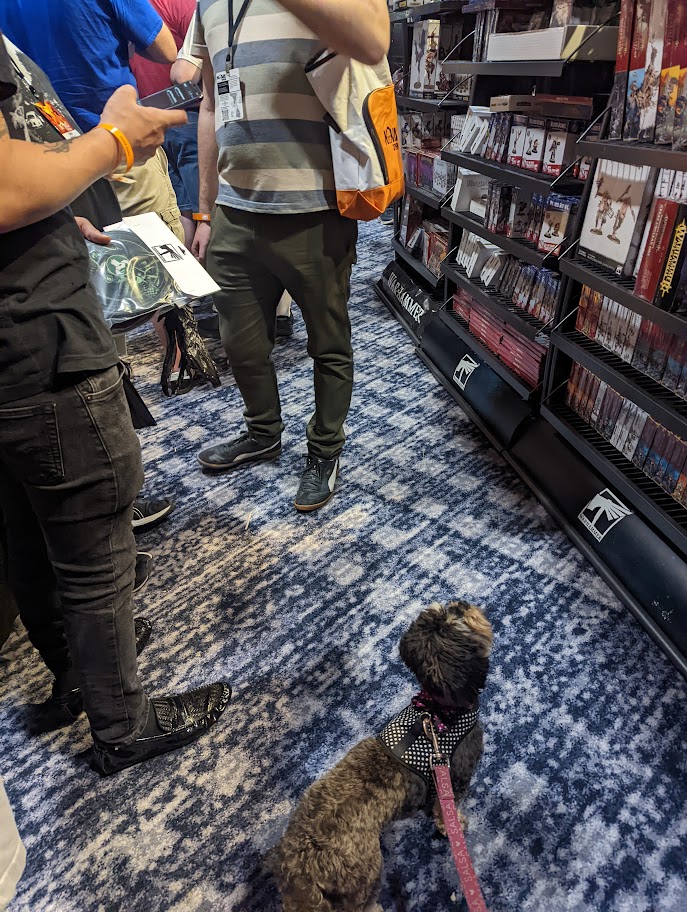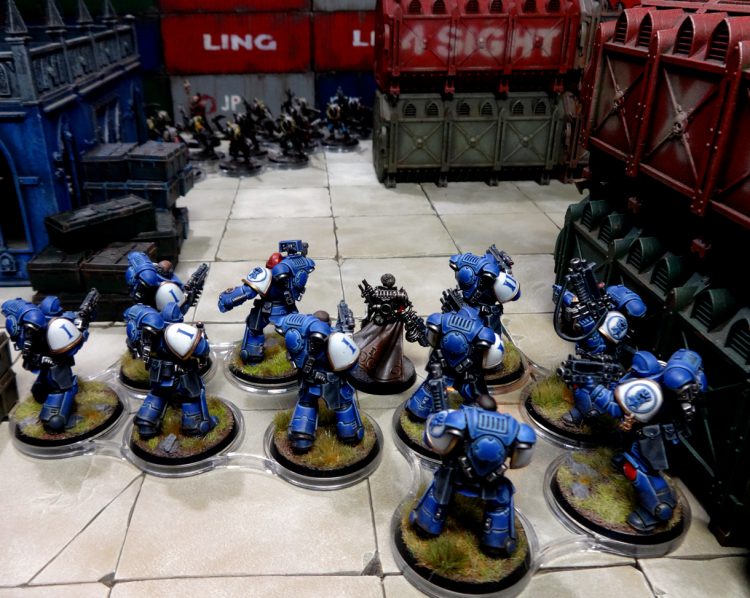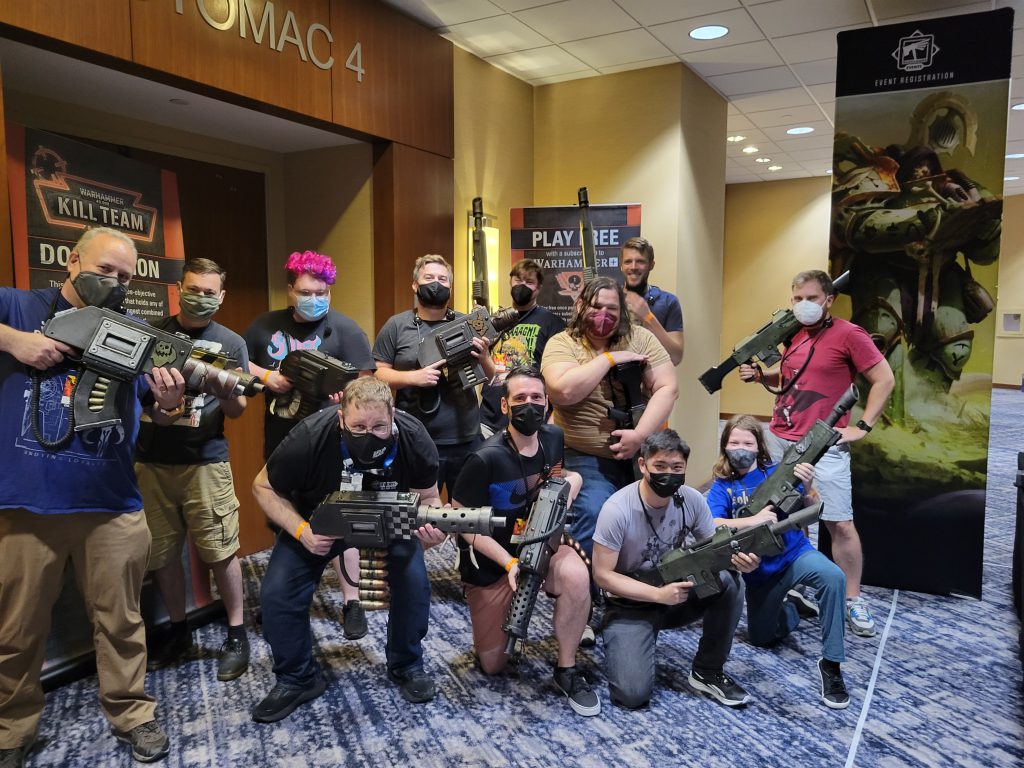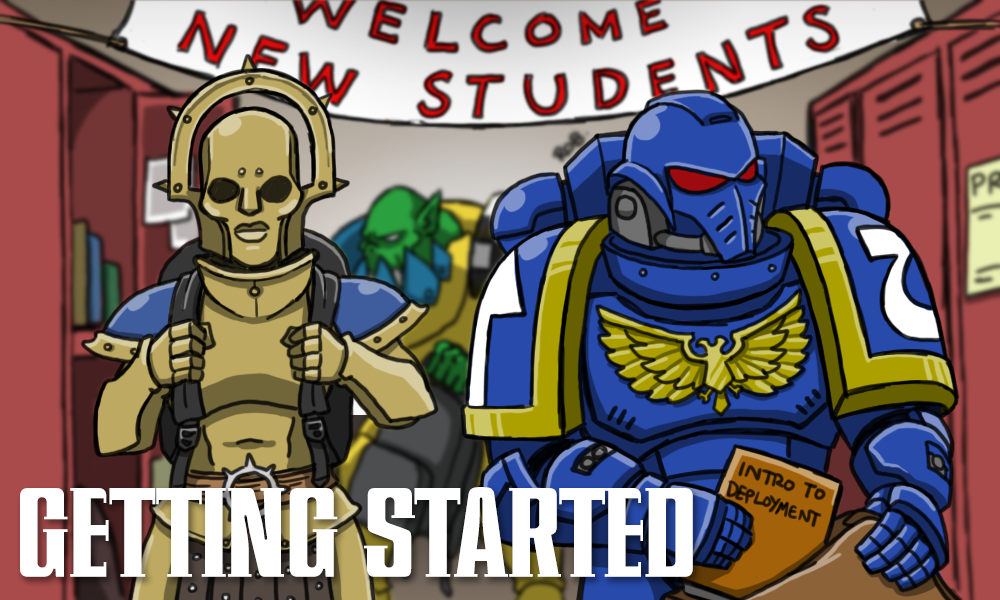Here in the extremely real Goonhammer offices we often get comments saying “Those games look cool, I wish I had a group to game with,” or “I wish I knew people interested in [insert game/play style].” Today’s post is here to help. Charlie B and Perigrin are here with tips on finding nerds, making nerds, and herding nerds.
Finding Nerds
Ours is a niche hobby, but if you’re in or near a big anglophone population centre, you’re in with a reasonable chance.
Being open about your hobby (but not boorish)
Charlie: A significant proportion of the people in my gaming group are there because I don’t hide the fact that I’m a wargamer. If people ask me what I do for fun, I let them know. I just don’t go on about it to people who aren’t interested.
If people give me shit for being a nerd (and in adult life I’ve found this almost never happens), I just calmly wait for them to start reciting sports facts without displaying even a hint of self awareness. I can’t tell you how much joy those moments give me.
Most people don’t ask that many follow up questions, and that’s both understandable and OK. Some people, however, turn out to either be preexisting Warhams, or Ham-curious. If they’re also people you’d like to socialise with, you’re on to a winner (see the section on Making Nerds further down). At least three of my regular gaming friendships exist thanks to my being open about what I do for fun.
Peri: In my experience your two easiest options for finding people who are already into this are either to go to your FLGS and ask, or try to find a discord server or, more likely, a facebook group for your area for Wargaming. Failing that, a lot of communities online have some sort of meetup/find a group channel or system, so you can ask around if there is anyone in your general area. I have used all of those techniques before at different points, and all of them help get things going.
Also I second literally just never being ashamed of doing Wargaming. Most people go home and watch Netflix for 8 hours before they go to bed, coming home and painting little dudes is by no means more embarrassing. It’s also growing in popularity all the time, so your odds of finding someone else who is interested is pretty high nowadays.

The Local Store
For a giant chunk of the Warhammer community, particularly in the US, Friendly Local Gaming Stores (FLGS) offer a place to play and meet new people. Historically this was also true of Games Workshop’s stores as well, although these days many of them have little to no room for gaming tables. We could discuss the whys and wherefores of that at length, but the key point is that independent gaming stores do often offer space to play… there’s a ‘but’ coming though.
An FLGS might be a magical haven of inclusive hobby joy. It might also be a repository of gatekeeping chauvinists with questionable hygiene. Them’s the breaks.
In either event, you lose nothing but time by popping in for some light reconnaissance. Are the staff and customers welcoming? If so, there are at least some non-assholes, and possibly some of your future friends.
Peri: FLGS’s have a pretty wide range in terms of clientele and general vibes. I highly, highly recommend starting your search at one, but if it seems unwelcoming or unpleasant, its better to bail early. Most will be happy to have you and happy to take your money, but some can end up with heavily entrenched bitter old grogs, which is never fun. Some areas also might not have an FLGS at all here in the states, which can be a huge bummer if you live in a rural area. FLGS’s are particularly good in the states for new players, as they usually have terrain, which can be a huge barrier starting out. At least in my experience.
Gaming clubs
This seems to be more of a thing in the UK, but if you are in the UK, this is probably one of your best options (although some UK cities are lucky enough to have an FLGS as well). Just Google wargames clubs in your area. If you aren’t familiar, clubs hire out community spaces (e.g. a community centre, some rooms in a school, etc) and use that space to host a games night. Members all contribute towards the running costs.
Where I live in Oxford, the GW doesn’t meaningfully host games, and there’s no FLGS with gaming space (what with rent being absurdly high) but there are three clubs within a half hour journey of my house. Admittedly I don’t use any of them, because I can squeeze two 6×4 tables into my living room, but if a bunch of my friends move away, this is where I’d go to get my ham fix and make new local friends.
If there are multiple clubs in your area, the usual rules apply: try different ones to see which group of people you like best.
Peri: Yeah I have never heard of a gaming club in this style in the US, in my personal experience, outside of college campuses, but there is probably nothing stopping you from creating one.
Charlie: an excellent point; every club owes its existence to someone deciding that if they build it, others will come. You can learn about a prime example of this by listening to episode 6 of the First Rank Fire podcast. It’s an interview with Peter Davies, the founder of the London Wargaming Guild, now probably the largest Wargaming club in the world. It all started out in a pub, and grew organically.
Facebook groups
There are approximately nine trillion Warhammer-based Facebook groups, with some offering a nicely moderated and positive vibe (e.g. the Independent Characters Community, that of the much loved and now-defunct podcast). Other groups… honestly it’s a crapshoot. Pop in, see what percentage of participants are whiny, entitled and/or deeply problematic swivel-eyed nutbags, then beat a quiet retreat. But hey, if you find a good spot, then maybe start asking around to see if there’s anyone geographically nearby. There’s probably only a 10% chance they’re stabby. I got chatting with a guy from Bristol in the ICs group, and while that is several hours from where I live, we got on sufficiently well that we’ve now travelled to each other for games and have had a grand old time.
Peri: I’d just like to add here that Facebook Groups will mostly get you older wargamers, with younger people increasingly using Discord or other platforms to organise groups. I say this as a young person who uses Discord to organise their group. The same rule applies to both, lurk for a while and vet the group to make sure that no one there is a crypto-facist or deeply unpleasant, because it is way easier to never interact with them, rather than trying to disentangle yourself from them.
Addressing the geography problem
Let’s say you do know people, but they’re a long way away. This is a bummer, and ultimately it means your gaming will have to manifest as infrequent binges.
Naturally this requires some organisation. Use a shared Google sheet or similar to establish when enough of your geographically disparate group can get together, either by going to the house best suited for gaming, or renting an Air BnB, or staying somewhere near a venue (like an FLGS or, say, the hotel near Warhammer World). Use these occasional trips, and the deadlines they create, to fuel your painting while you’re at home.
Making Nerds
Some people don’t realise they’re wargamers. You can fix this.
Warhammer’s a niche thing, but people with the wargamer gene will see armies of little painted people and are just innately excited even if they have no idea what they’re looking at. They may have seen them online, or in your house, or when passing a gaming store… doesn’t matter. Those people need your help, particularly if they’re adults, because adults are more afraid of doing things badly and consequently will talk themselves out of a good time.
If you have a gaming setup at home, or even just a tiny 2’x2′ area, you can run an intro game, and/or take someone through painting their first mini. If you do well enough, then congratulations: you are now their Ham parent. We’ve already covered how to manage this process in our guide to hobby intros.

If you don’t feel able to give such an intro, but you’re aware of a good local GW or FLGS where they run decent intros and have a nice vibe, then you can at least point them in the right direction. Running an intro does take skill, but there’s only one way to jump that hurdle: just do it.
Peri: I find that video games are an incredibly good infection vector for wargaming. If someone has played any sort of turn based strategy game, you can probably get them interested in the tabletop game. Not everyone will be on board with the painting and modelling though, at least at first. There are wargames that don’t require it, like the excellent Star Wars Armada, so you still have options even if they are completely unwilling to invest in the hobby side of things. Most people in the nerdosphere are at least vaguely aware of Warhammer, which makes it easy to get people into, because they probably played a video game or read a book starring one of the factions or another.
Also, I have found that it is a good idea to have the stuff for both sides of a nice, balanced starter game of whatever your preferred system is. And, well, let the wookie win. Most people don’t want to get stomped on the first time they try something. I have basically no negative response to losing games, but I am the exception, not the rule. Making sure that you can introduce a new person to the game and hobby before they have to buy anything is important, because it avoids the horrible situation of someone being talked into a starter box for a game they end up hating.

Herding Nerds
Organising people and encouraging them to try new things can be non-trivial.
Organising games
Peri: I’ll be speaking from the perspective of someone who organizes a group that mostly plays at an FLGS. The first and most important step, in my opinion, is to find a messaging app that everyone actually uses. Splitting people between facebook, discord, and god knows what else will cause issues and reduce the amount of people who are actually playing. Trying to keep people in one place and being patient with them is the best way forwards here. I personally like Discord because it lets you break down text conversations by topic, which makes it a lot easier to find people looking for a game, instead of them just getting buried beneath some talk about new rules or a different game.
The second most important step, after that, is to try and set a specific day that everyone tries to come in and play. This could be every week, bi-weekly, every month, or whatever, as long as it is consistent. This lets people who come into wherever you play and ask “Hey, when are the 40k/Armada/Battletech/whatever players here?”, get an answer with a specific day, rather than “Whenever they feel like”. Even if people organize games outside of this and everyone doesn’t show up on the designated day, this makes onboarding new people much, much easier.
Charlie: having a set day each week makes things a lot easier. Admittedly it’s not always an option, particularly for people who do shift work, but where it is an option it’s the best.
When it’s not an option, then for smaller gaming groups having a shared sheet or calendar everyone can access really helps when finding dates for gaming sessions (rather than an impossibly long back and forth in Discord or WhatsApp or whatever). My smallish group of ~10 players generally use a Google Sheet; here’s a basic template you can use. Nothing fancy, but save a copy to your own drive and edit away!
Instigating new games and play styles
The phrase be the change you want to see is extremely apt here. Let’s say you want to get your gaming group to try something outside their standard fare, be it a play style or a new game entirely. It might be a reach to get everyone on board in one fell swoop, and besides, just because you’re into it doesn’t mean everyone else will be.
I’d suggest playing a single game of [style/system] with one other person in your group, particularly if the others are around at the same time. If it’s fun, your opponent will talk about it. Have the patience to work your way around a few other people, one game at a time, sewing the seeds of [style/system] joy. Then suggest a one-off [style/system] gaming day, since self-contained things have lower emotional barriers to entry. Perhaps just do it with a smaller portion of your gaming group. You don’t have to involve people who aren’t interested, just like you aren’t obliged to attend every event for a [style/system] you don’t enjoy.
My personal experience as a narrative dork is that matched play presents an easy default choice that people end up following without thinking to try the other game modes, but that many people who don’t hugely enjoy that experience end up really enjoying narrative play once they try it.
Narrative gaming side note: by narrative play I don’t necessarily mean Crusade. I like Crusade, but it’s just a levelling up system, and that’s just one component of narrative play. If people play Crusade competitively, it becomes like matched play but with worse balance and more admin. Part of your job as the instigator of new ways to play is to showcase not just the physical products or rules, but also the mindset and social contract behind that mode. In narrative play, that means making deliberately non-optimal upgrade choices to avoid breaking the game. Add a +1 Damage bonus to a Repulsor Executioner’s main gun and it doesn’t make a huge difference. Add it to a gun with a high rate of fire but lower damage and you can get game-breaking results and bad feels aplenty.
Ultimately there are a whole bunch of ways to introduce people to different styles of gameplay, and one of those methods is attending an organised event. The London Wargaming Guild’s fun and fluff tournament is a good example of an informal way to show people that tournaments aren’t inherently scary and are about more than who wins.
Peri: I have developed a reputation in my local group for dragging everyone else into whatever game I am most interested in at the moment, so I have a lot of advice here. For one, and this is by far the most important, if you are trying to get people interested in a whole new game with different models, OWN TWO FORCES IN THAT GAME!!! You can’t reasonably ask people to drop money on a game they may not even enjoy, so having two (reasonably balanced) forces/armies that you can use to demo the game to them is really important. This lets them try out the game without any investment on their part other than an evening and a drive/walk.
The second most important thing is to generally be positive. If you are excited and happy to try a new game, a lot of people will sort of leech off your positive vibes and get excited themselves. This mindset is infectious, and it can lead to a lot of excitement for whatever thing you want to try.
A third thing, more of a specific tip, is that I really like to pitch a new game to someone by finding the most absurd bit of rules text or lore that I can within a game, and telling them that. Like how in Battletech one of the playable factions is a extremist religious offshoot of the space phone company, how in Turnip 28 there is a faction that is just two women in a hot air balloon writing travel reviews of the battlefield and throwing bricks at people, or how in Necromunda there are rules for running around randomly while on fire and a chart for how drunk your models are. These strange facts or rules tend to grab people’s interest a lot faster and a lot harder than talking about its dice system or balancing, and they may be more interested in trying a game out if you happen to have a couple of forces for it already. Another good idea for that first pitch is to talk about some cool things you can do in game. I don’t mean in the “This army can make a 18 inch charge and get +3 Strength on the charge!” sense, which is cool to established players, but more in the “You House Goliath boss can dive off a building while on fire but not giving a shit about it and give someone the people’s elbow on the way down” sense, or the “Because of how equipment slots work, your kraken can wear 4 pairs of boxing gloves, breath air, and crawl up castle walls at night to punch people to death with 8 times the normal boxing glove attack rate, on account of all the extra limbs” sense. Describe cool and interesting situations that the rules create, but without any specific rules jargon, unless they ask for more details on how exactly that works in the game.
Go forth and multiply
I’m sure there’s a lot more we could have touched on, so please do the community a solid and drop any other useful tips in the comments section. And most importantly: go forth, and bring new friends to the tabletop!
If you have other thoughts, feelings or ruminations then as usual: contact@goonhammer.com


